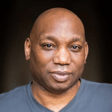
Episode 493: Masha Hamilton Asks Is the Writing Worth Rearranging Your Calendar For?
"This has to be meaningful to you. It has to be a story that won't leave you alone, a story that you're willing to rearrange your calendar for," says Masha Hamilton, whose Atavist Magazine story is titled "I've Gone to Look for America."
Today we have Masha Hamilton, a journalist, a novelist, a fan of the show, a fan of Pitch Club. You’ll want to visit mashahamilton.com to learn more about her wide-ranging career covering the world. She’s the author of five novels and trying to sell her sixth. She was at one point the director of communications and public diplomacy at the US embassy in Kabul.
Her story for the Atavist is about her driving the entire length of I-95 with her photographer son Cheney, and stopping at just about every rest stop to speak with strangers about how they feel about our country. “Conversations and revelations about an ailing nation along Interstate 95.” Man, those Atavist editors sure can write the hell out of a dek.
Guess who’s back!? Seyward Darby! Do your best Kermit the Frog dance. Very nice to hear her and this piece challenged Seyward in ways I didn’t see coming: Meaning, she didn’t share Masha’s optimism or hope. Seyward, for lack of a better word, disagreed with it, so there was an interesting tension she brought to the edit.
For Masha's part, we talk about:
- Novels as complimentary to her nonfiction
- Covering societies in change
- Healing through story
- How this was piece was a therapy session
- Accelerated intimacy
- Endings
- Middles
- Finding the meaning
- Writing you rearrange your calendar for
- And belonging as practice
Newsletter: Rage Against the Algorithm
Show notes: brendanomeara.com



















